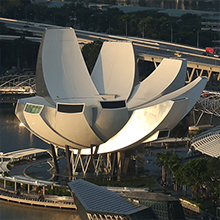Singapore is a high-income economy built on a business-friendly regulatory environment and strong investments in infrastructure, education, healthcare, and public services. The city-state is among the world’s most competitive economies and ranks highest in the 2020 World Bank Human Capital Index.
In the decades after independence in 1965, Singapore rapidly developed from a low-income economy to a high-income economy. GDP growth in the city-state has been among the world’s highest, at an average of about 7% since independence and topping 9.2% in the first 25 years.
After rapid industrialization in the 1960s lifted the island nation’s development trajectory, manufacturing became the main driver of growth. In the early 1970s, Singapore reached full employment and joined the ranks of Hong Kong SAR, Republic of Korea, and Taiwan, China, a decade later as Asia’s newly industrializing economies. The manufacturing and services sectors remain the twin pillars of Singapore’s high value-added economy.
The overall growth of the Singapore economy was 1.1% in 2023. Construction (+5.2% y-o-y) led the growth in goods- producing industries, driven by expansions in both public and private sector projects. Services industries registered broad-based growth, led by accommodation (+12.1% y-o-y), and information and communications (+5.7% y-o-y) on the back of strong international visitor arrivals and robust demand for data hosting services, respectively. Economic growth is expected to be modest in 2024, with the government forecasting a range of 1% to 3%.
In February 2021, Singapore launched the “Singapore Green Plan 2030”, a whole-of-nation movement to advance Singapore's national agenda on sustainable development. The Green Plan charts ambitious and concrete targets over a 10-year period, strengthening Singapore's commitments under the UN's 2030 Sustainable Development Agenda and Paris Agreement, and positioning Singapore to achieve net zero emissions by 2050.
In the most recent World Bank Human Capital Index, Singapore ranks as the best in the world in human capital development. Together with strong financial support from the government, the city-state continues to strengthen the nimbleness and flexibility of its workforce by providing continuing education such as the Skillsfuture initiative.
Last updated: July 2024

